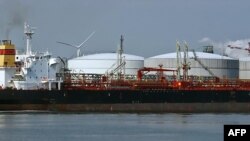Pressured by strict U.S. sanctions, Venezuela's oil exports plunged by 376,500 barrels per day (bpd) in 2020, according to Refinitiv Eikon data and internal documents from state-run PDVSA, financially squeezing socialist President Nicolas Maduro’s government.
The administration of U.S. President Donald Trump also put curbs on PDVSA's main trading partners, the owners of tankers still transporting Venezuelan oil and on the fuel supply to the gasoline-thirsty nation.
The punishment, aimed to oust Maduro after his 2018 reelection was called a sham by most Western nations, has led PDVSA to pursue new customers, rely on mostly unknown intermediaries to resell its oil and deepen ties with Iran, another country under U.S. sanctions.
Venezuela's exports of crude and refined products fell 37.5% in 2020 to 626,534 bpd, the lowest in 77 years. The decrease was even larger for fuel imports, which fell 51% compared with 2019, to 83,780 bpd, according to the data.
The drop in the crude oil was several times that of the global market, which fell about 9% last year amid COVID-19 constraints.
PDVSA did not reply to a request for comment.
The state-run company's inability to revive exports and its new dependence on imported fuel have sunk OPEC member Venezuela's petroleum industry to levels not seen since the 1940s, when it was boosting crude output while planning its first refineries.
PDVSA inaugurated the 310,000-bpd Cardon refinery on the country’s northwest coast in 1947. The facility, along with neighboring Amuay, remain mostly idled because of a lack of maintenance, parts and proper crude to operate.
Despite the sanctions' impact on the economy, Maduro has held onto power with the support of the military, and backed by Cuba, Russia and China.





